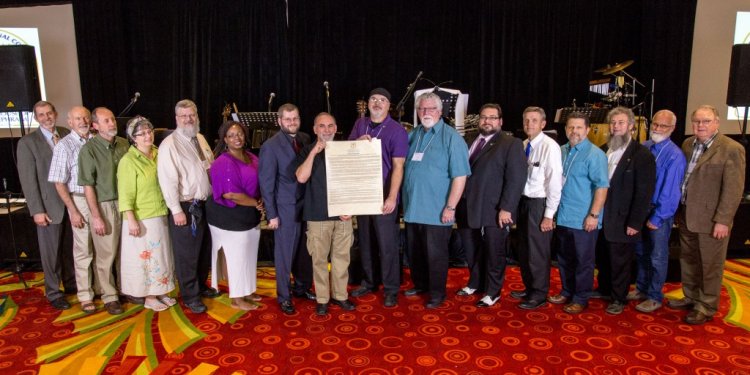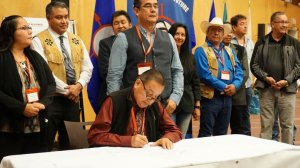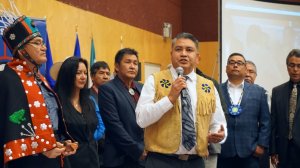
First Nations of North America
 The thunderous pounding of Indigenous drums echoed floating around on Thursday much more than 50 native countries across united states rallied collectively to sign a historical, pan-continental treaty alliance against oilsands development within their conventional territory.
The thunderous pounding of Indigenous drums echoed floating around on Thursday much more than 50 native countries across united states rallied collectively to sign a historical, pan-continental treaty alliance against oilsands development within their conventional territory.
The collaboration, formalized at multiple ceremonies in Quebec and B.C., aims to prevent all proposed pipeline, tanker, and rail tasks affecting First Nations land and water, including TransCanada's Energy East pipeline, Kinder Morgan's Trans hill development, Enbridge's Line 3 pipeline, and Enbridge Northern Gateway.
At signing on Musqueam land in Vancouver, the lineup of chiefs waiting to put their names down chock-full a whole area. It had been a powerful ceremony, and members clad in the regalia of their countries travelled from across B.C. and north Washington is area of the developing activity.
Grand Chief Stewart Phillip associated with the Union of BC Indian Chiefs, who also signed the document, said native individuals will not any longer stand for dangerous projects to their territory that advance the risk of climate modification.
"In this period of great challenge we know that other First Nations will sign up, " he stated, extending the invitation to native communities everywhere.
"Based on our sovereign, built-in to self-determination, we've collectively decided that individuals will get our sacred responsibilities toward land, waters, and folks. We will bond in unity and solidarity to safeguard our area from the predations of big oil interests, industry, and exactly what represents."
It's a motion that's currently happening, he added, without any much better example than in North Dakota, in which the Standing Rock Sioux have actually forced the us government to pause Dakota Access pipeline construction.
Grand Chief Stewart Phillip of Union of BC Indian Chiefs signals the Treaty Alliance Against Tar Sands Expansion in Vancouver, B.C. on Thurs. Sept. 22, 2016. Photo by Elizabeth McSheffrey.
 Meeting the call to climate modification duty
Meeting the call to climate modification duty
The document, called the Treaty Alliance Against Tar Sands Expansion, commits its signatories to help each other whenever called upon within the struggle against oilsands development, and also to work in cooperation to move society towards even more sustainable lifestyles. By aligning themselves with other Indigenous nations across Canada while the north U.S., members aspire to make sure that dangerous jobs are not able to "escape" through the use of alternative routes.
“We have the right as well as the obligation to quit these major threats to our lands, our oceans and our peoples, ” said Kanesatake Grand Chief Serge Simon. “For instance, from Quebec, we're going to assist our very first Nation allies in B.C. to make certain that the Kinder Morgan pipeline does not pass, therefore we know they’ll assistance united states perform some exact same against Energy East.”
It comes down not only from a legal and social obligation to guard their land, liquid, environment, and environment from damage, stated Grand Chief Derek Nepinak of the Assembly of Manitoba Chiefs, but a desire to protect another for several individuals, native and non-Indigenous besides.
“We wish to utilize the Prime Minister together with government to develop a lasting economic climate that doesn't marginalize our individuals, ” he stated. “This is a time of great religious awakening for the individuals once we reinvigorate our Nations and make certain an improved the next day for several.”
While First countries, environmentalists along with other crucial stakeholders across united states argue that pipelines, tankers, and oil by railway boost the chance of catastrophic oil spills, threaten vital marine and terrestrial ecosystems, and place international environment targets unrealistic, power companies believe they're going to revitalize struggling Canadian economies by taking power to international areas.
The energy organizations also argue that their proposed projects promote trustworthy resources development. The Canadian Association of Petroleum Producers however, Canada's biggest oil and gas lobby team, said the Treaty Alliance will likely not change the way its members work with native communities.
Chief Terry Teegee associated with the Carrier Sekani Tribal Council in Prince George, B.C. calls all very first Nations to face together within the fight against oilsands expansion, Thurs. Sept. 22, 2016 in Vancouver. Photo by Elizabeth McSheffrey.
Coal and oil industry to continue
"Our member organizations use First Nations and Metis communities constantly, frequently, and possess a long history of doing that, " stated Brian McGuigan, CAPP's supervisor of aboriginal policy. "we will consistently use all of them. Users make use of all of them each day and have really good connections... It's not always easy conversations, nonetheless they continue the dialogue."
He would maybe not comment on whether he felt the newly-signed document would impede CAPP's aim of getting Canadian oil to tidewater.
The brand new pact builds on a series of significant very first Nations victories against oilsands expansion jobs, including a Federal Court of Appeal choice in Summer that overturned the Harper government's endorsement of Enbridge Northern Gateway task, and rallies over the continent that contributed to U.S. President Barack Obama's decision to destroy the Keystone XL pipeline.
rtve researchgate astro.wisc.edu engawa.kakaku.com search.auone.jp id.telstra.com.au sitereport.netcraft.com wikimapia.org nutritiondata.self.com kaskus.co.id digitalcollections.clemson.edu superherohype.com tools.folha.com.br talgov.com minecraft.curseforge.com curseforge.com foro.infojardin.com camfrog.com popcouncil.org drinksmixer.com















